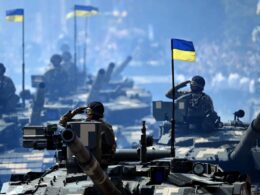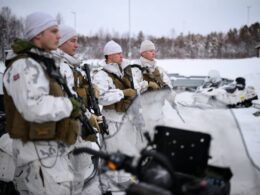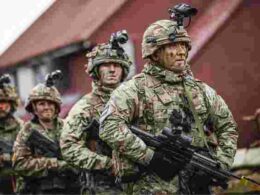The head of the Luhansk region patrol told NV what it was like to take adults, children, and animals out of the shelling for three months in a row.
Viktor Levchenko, the head of the Luhansk patrol police, has experienced more in the last three months than in all his previous thirty-three years. Since the beginning of the war, he has faced human grief almost daily, as he has devoted all this time to the evacuation of civilians from the war zone. Sometimes during the day, his team rescued 3-to 5 thousand inhabitants of the region.
By February 24, about 280-300 thousand people lived in the three largest cities of the unoccupied part of the Luhansk region – Lysychansk, Severodonetsk, and Rubizhne. Many of them left the war zone alone. A specialized team led by Levchenko, risking their lives, evacuated 42,000 locals from the region, who would otherwise remain there.
For this work, Levchenko received the Medal of the Defender of the Fatherland and the Order of Bohdan Khmelnytsky III degree, as well as a severe concussion: the group in which he was, recently got under fire. As a result, a French journalist was killed and policemen were injured. So the head of the Luhansk patrol police got to the hospital.
A native of Mykolayiv who has worked in the Luhansk region for the past three years, Levchenko described to NV what he saw with his own eyes. The editorial board publishes his story in the form of a first-person monologue.
The beginning of the war
If for the whole of Ukraine the war began on February 24, 2022, in Luhansk and Donetsk regions the war has been going on since 2014. These regions were under constant shelling by Russian mercenaries. Our soldiers were killed and wounded there. The war there lasted a long time.
About a week before the start of the large-scale invasion, very heavy shelling began in the city of Shchastia, namely residential areas. An evacuation from the city was planned but was not carried out.
Our entire unit was brought to maximum readiness. On February 23, my deputy and I were on night duty, sitting in my office. It was all in Lysychansk.
Around 4:00 in the morning, I opened YouTube while the deputy took a nap. And I saw that the online broadcast of this “Botox freak” [of the President of the Russian Federation] has begun. I heard his rhetoric about the Nazis and some of his senile nonsense, and I immediately woke up the deputy, raised the commanders, and said, “This is war.”
“Botox” has not finished speaking yet, and we have already announced the alarm, and gathered all the personnel. And somewhere around 05.00 in the morning, when he finished his madness, very strong explosions and rocket flights began. Everything exploded everywhere! We also heard distant battles, there were explosions directly in our city, and enemy aircraft were working.
Fighting began in the Luhansk region, our troops withdrew, because the enemy shelled very hard, broke through, and surrounded us. Our troops retreated to more advantageous positions where it was possible to contain this invasion because they were outnumbered by Russians several times.
Evacuation
All functions of the patrol police immediately became unnecessary, traffic rules ceased to exist. We started from what is now most necessary for the residents. After all, we gave the oath to whom? To the Ukrainian people.
On the third or fourth day, the shops were not working properly, the cities were constantly shelled, and people started having problems with food, medicine, and drinking water. We organized a humanitarian headquarters, where we brought food, diapers, and hygiene products, and made a huge warehouse.
There was still connection [in the region]. People called, and information went further. A patrol car arrived, loaded, and delivered targeted humanitarian aid. Patrol policemen got involved as much as possible and delivered medicine and humanitarian aid, working closely with the civilian-military administration.
Then people started leaving. Who could leave by the car – left. But there were still many who did not have their transport. We took such people to the train and they left for Western Ukraine.
But then the “Rashists” [Russian Nazis] completely destroyed the railway tracks to Lysychansk and Rubizhne. Somewhere in the second month, perhaps a little earlier, the railway connection was already destroyed. Then the evacuation to the border with the Dnipropetrovsk region began, and the train was going from there.
Evacuation routes were constantly changing, and transport was also changing because it was failing quickly after the shelling. The military-civilian administration took buses from other regions. There was a critical shortage of drivers, because this is really a combat zone and many drivers left. That’s why many patrolmen got behind the wheel, some of them didn’t have the necessary categories, didn’t know how to drive these buses – we studied on the go. They repaired buses as much as possible, sat down and went to the most infernal places of Luhansk region – rescued people from there.
In the first month, a lot of people left. We evacuated 3-5 thousand citizens a day. Then there were fewer and fewer people – 200-300 people were evacuated. We traveled throughout the free Luhansk region, which had not yet been captured by the Rashists: Popasna, Hirska Hromada, Toshkivka, Orikhove, Novodruzhesk, Privillya, Rubizhne (where fighting was still going on at the time), and Severodonetsk.
Then, when the influx of people stopped, we started getting information through the locals and their relatives, because there was no connection – where are the people who need to be evacuated. Then we organized an operation, it can’t be called otherwise, we thought of routes and then we left. We visited the shelters where people were and in some places persuaded them, told them about the situation that staying here is deadly. We brought food to those people who still refused to leave. That’s all we could do to help them at the time. We evacuated people who wanted to evacuate, repeatedly coming under fire. And so – non-stop.
Children and not just them
My great pain is the children who remain in the war zone. The most important thing for me personally is to save our future. The adult can decide for himself what he wants and what he does not. And the children have not seen life yet, they cannot assess the risks. They do not deserve to see death, destruction, and constant danger.
We told the parents of young children: “Get out of storage, you will see that everything is destroyed, you have nothing to eat.” If we didn’t bring them food, people would starve. We explain that the “Rashists” do not care about the population, they only care about capturing the territory in any way and at the same time destroying the maximum number of Ukrainians. This was shown by the example of Mariupol, Bucha and Irpen. That is why we worked very actively with the parents of young children.
For me and the patrol it was a great happiness if I managed to save at least one child with his parents.

About a week ago we managed to take out 13 young children in one flight. This is a sensation! These children will no longer fall victim to artillery shells or “racists”. They are now in Western Ukraine and Europe. And most importantly, the Russians will not steal these children, as they do in Mariupol.
Unfortunately, some children still remain in the Luhansk region. For me, even if one child stays there, it’s a lot.
Our position is this: even for the sake of one life, it is worth the risk. This distinguishes us from the Russians because for them people are just statistics. For us, every life is of value.
We recently went to Bilohorivka. I think everyone already knows this village, it is called “Bilobayivka” and “Chornohorivka” [drawing analogies with Chornobayivka in the Kherson region]. There the Russians tried to force the Seversky Donets, and a lot of their vehicles were destroyed. They captured this village, and then our people drove them out.
We have received information that there are still people who need to be evacuated. Only two of them wanted to leave. We put them in the car and evacuated. It is difficult to describe this village, it is destroyed, there is nothing there.
There was a case of evacuation of animals. Through the third people we received information that on the outskirts of Rubizhne, which was already almost occupied at that time, there is a shelter – about 40 dogs and three of their owners. Since there was heavy fighting, no one brought food or dog food, and the fighting lasted more than a month. We do not have specialized transport for animals, but there are ordinary minibusses in which our special forces travel. And we decided that we would go with them, somehow put dogs there, people will get in, and we will evacuate.
We went there by two buses and one patrol car, which I was in. Our task was to cover up because this is the outskirts of Rubizhne – behind the house with the shelter there was a forest, and enemy sabotage groups were moving in that area. My colleagues and I kept the exits from the forest a gunpoint, while others just threw and loaded these dogs into buses. They were very thin, it was scary to see them.
We first took them to Lysychansk, and from there others took the dogs to Zaporizhia. Their owner then sent us a video that everything is cool, the dogs have recovered a little and feel great.
French journalist
Armored vehicles for evacuation appeared only two weeks ago. The head of the military-civilian administration (CIA) gave it to us because now all roads in the Luhansk region are being shot at, it is extremely dangerous to take people out by unarmored vehicles.
When a French journalist [Frederic Leclerc-Imhoff, a correspondent for the French channel BFM TV, was killed on May 30] was killed, I was in the same car with him.
I was previously contacted by the OVA and told that French journalists and their translator would cover the evacuation. We met with them, I suggested: let’s give you an interview, and then, when we take people out, you will record them on camera here [in Bakhmut], because it is dangerous to go. They consulted with each other and decided to go with us anyway.
We all got into an armored car and left. We entered the city of Lysychansk and got under shelling. A shell exploded right in front of us. All I remember is the road, then the ringing in my ears, the smoke in the cabin, the dust, the completely cracked and broken armored glass. I don’t know what it was, the investigation will establish. The explosion was quite strong, I was disoriented for a while.

When I regained consciousness, I turned to the driver, a patrol officer: “How are you, bro?”. He says his eyes are bleeding. I saw his face – it was completely bloodied. I started talking to him. I told him that we need to leave, because the shelling continues and if we stop at this moment, there is almost no chance to survive. He did not give up the wheel, we left and drove for 5 minutes. Later we found out that the fragment pierced his helmet and caused very serious head injuries. But fortunately he survived, the helmet saved his life.
The radio station reported that there were severely wounded among us. We tried to help the French journalist as much as we coukd, because we were all injured.
It is difficult to convey what it is like when an artillery shell explodes in front of you. When we arrived, Frederick was pulled out. Police officers who were already on the scene checked his pulse and said he had not survived.
I have a severe contusion. Another patrolman had shrapnel wounds to the head and also a contusion. Another police officer had a concussion and minor shrapnel wounds to his legs.
Thoughts about the war
Russians are not our brothers. And they never were. They always tried to destroy us, to absorb our culture.
What they are doing now is just genocide. They are destroying our cities, they don’t even think about where they are shooting, they just want to destroy everyone. Therefore, this is a war for the survival of the Ukrainian nation. This is not the liberation of Donbass, as they say. Now the whole country is united and helping our Armed Forces. All united to resist this onslaught. So we will definitely win. Unfortunately, there will be very big losses. But we will win.
I’m not a person important enough to decide what’s next. As the commanders will say, so we will work. Now I will get my health a little better so that I can fully perform my duties. But I am sure that the work will not change: I will again be helping our citizens.








